
Anthropological Notebooks
Scope & Guideline
Cultivating Innovative Ideas in Contemporary Anthropology
Introduction
Aims and Scopes
- Cultural Anthropology:
The journal focuses on cultural anthropology, investigating the practices, beliefs, and social structures of various communities across the globe. - Environmental Anthropology:
A significant emphasis is placed on the interaction between humans and their environments, highlighting issues such as climate change, sustainability, and ecological justice. - Medical Anthropology:
The journal explores health-related issues through an anthropological lens, examining the cultural dimensions of health, illness, and healthcare systems. - Political and Economic Anthropology:
Research often delves into the intersections of politics, economy, and social organization, looking at how these factors shape human experiences and societal dynamics. - Ethnographic Methodologies:
There is a strong commitment to ethnographic research methodologies, capturing lived experiences and narratives to provide deep insights into cultural phenomena.
Trending and Emerging
- Climate Change and Human Impact:
Recent publications increasingly address the socio-cultural impacts of climate change, highlighting the urgent need to understand human-environment relations in the Anthropocene. - Gender and Sexuality Studies:
There is a notable rise in research exploring gender and sexuality, especially in relation to migration, identity, and socio-political contexts, reflecting broader societal discussions. - Mental Health and Well-Being in Agriculture:
Emerging themes focus on the mental health challenges faced by agricultural communities, indicating a growing awareness of the psychological impacts of socio-economic changes. - Globalization and Cultural Exchange:
The journal is increasingly publishing works that examine the effects of globalization on local cultures, emphasizing the complexities of cultural exchange and adaptation. - Digital Anthropology:
With the rise of technology, there is a growing interest in digital anthropology, exploring how digital spaces shape social interactions and cultural expressions.
Declining or Waning
- Traditional Historical Studies:
There appears to be a waning focus on traditional historical studies that do not incorporate contemporary anthropological perspectives, as the journal shifts towards more dynamic and interdisciplinary approaches. - Static Cultural Representations:
Research that presents static or unchanging views of cultures has decreased, as the journal increasingly emphasizes the fluidity and change inherent in cultural practices. - Overly Specialized Methodological Approaches:
There is a decline in the publication of papers that utilize overly specialized or narrow methodological approaches, with a preference now for broader, more integrative methodologies.
Similar Journals
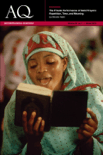
ANTHROPOLOGICAL QUARTERLY
Fostering Interdisciplinary Dialogues in the Arts and HumanitiesANTHROPOLOGICAL QUARTERLY, published by the George Washington University Institute of Ethnographic Research, stands as a vital resource in the field of anthropology and broader arts and humanities studies. With an ISSN of 0003-5491 and an E-ISSN of 1534-1518, this esteemed journal has been contributing to academic discourse since its establishment in 1981. The journal holds a respected position in both the Q2 category for Anthropology and the Q2 category for Arts and Humanities (miscellaneous), demonstrating its impact and relevance, as evidenced by its rank of #152 out of 502 in the Social Sciences sector for anthropology and rank of #179 out of 552 in the Arts and Humanities field. Researchers, professionals, and students can rely on ANTHROPOLOGICAL QUARTERLY for rigorous peer-reviewed articles that push the boundaries of ethnographic research and anthropological theory, addressing contemporary issues with scholarly precision. The journal’s commitment to fostering critical analysis and interdisciplinary perspectives establishes it as an essential platform for advancing knowledge within its diverse and dynamic field.
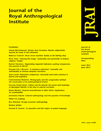
JOURNAL OF THE ROYAL ANTHROPOLOGICAL INSTITUTE
Bridging Cultures Through Scholarly ExcellenceJOURNAL OF THE ROYAL ANTHROPOLOGICAL INSTITUTE, published by Wiley, stands as a prestigious platform for scholarly discourse in the field of anthropology. With an ISSN of 1359-0987 and an E-ISSN of 1467-9655, this journal has been a vital resource for researchers, professionals, and students since its inception, featuring contributions that push the boundaries of understanding in both cultural and social anthropology. The journal’s rigorous peer-review process affirms its high academic standards, reflected in its top-tier Q1 rankings in both the Anthropology and Arts and Humanities categories for 2023. With a current ranking of #78 out of 502 in Social Sciences Anthropology and #138 out of 552 in Miscellaneous Arts and Humanities, it inhabits a critical space within academia, addressing seminal issues and innovative research. While the journal is not open access, it remains accessible to those affiliated with institutions that provide subscriptions, ensuring that groundbreaking anthropological insights are disseminated widely within the academic community. As it converges from 1995 to the present, the JOURNAL OF THE ROYAL ANTHROPOLOGICAL INSTITUTE continues to shape the landscape of anthropological research, engaging a diverse readership eager to explore the intricate tapestry of human cultures.

Focaal-Journal of Global and Historical Anthropology
Pioneering Insights into Anthropological PracticesFocaal-Journal of Global and Historical Anthropology is an esteemed academic journal published by BERGHAHN JOURNALS, focusing on the intricacies of global and historical anthropology. With an impressive impact factor and positioned in the Q1 category of anthropology for 2023, this journal is recognized for its exceptional contributions to the field, ranking #121 out of 502 in the Social Sciences category on Scopus. Since its transition to Open Access in 2020, Focaal has made significant strides in democratizing academic knowledge, allowing broader accessibility for researchers, professionals, and students worldwide. The journal provides a platform for interdisciplinary dialogue and critical analysis, paving the way for innovative research and thought-provoking discussions. With a commitment to fostering a deeper understanding of anthropological practices and their global implications, Focaal is an essential resource for anyone engaged in contemporary anthropological studies.

Anthropological Journal of European Cultures
Illuminating the Diversity of European Cultural NarrativesAnthropological Journal of European Cultures, published by BERGHAHN JOURNALS, is a premier Open Access journal dedicated to the exploration and analysis of cultural dynamics within European societies. With an ISSN of 1755-2923 and an E-ISSN of 1755-2931, the journal has been providing a platform for critical discourse in anthropology and cultural studies since its inception in 2008. Catering to a diverse readership of researchers, professionals, and students, the journal plays a vital role in fostering a deeper understanding of European cultures through rigorous scholarship. It has garnered commendable rankings, including Q3 in Anthropology and Q2 in Cultural Studies for 2023, reflecting its growing influence and quality within the academic community. The journal is committed to Open Access since 2020, ensuring that cutting-edge research is freely available to all, thereby enhancing its reach and impact in the global discourse on culture and anthropology. With its comprehensive and interdisciplinary approach, the *Anthropological Journal of European Cultures* serves as an essential resource for advancing knowledge and promoting dialogue in these dynamic fields.
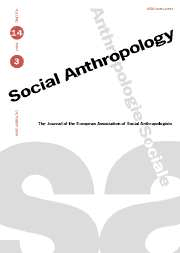
Social Anthropology
Advancing Knowledge in Sociocultural DynamicsSocial Anthropology is a leading journal published by BERGHAHN JOURNALS, focusing on the diverse and dynamic field of anthropology. With an ISSN of 0964-0282 and an E-ISSN of 1469-8676, this open-access journal has been a cornerstone of scholarly communication since its inception in 1982, becoming fully accessible to the public since 2022. Situated in the United States, the journal aims to disseminate high-quality research that explores sociocultural dimensions of human behavior across various contexts, addressing pressing contemporary issues through a multidisciplinary lens. With impressive rankings, including Q2 in Anthropology and Arts and Humanities, and strong positions in Sociology and Developmental Psychology according to Scopus metrics, Social Anthropology serves as an essential platform for researchers, professionals, and students committed to advancing our understanding of social practices and cultural norms. Its commitment to fostering intellectual discourse makes it a vital resource for those seeking to deepen their knowledge and insight into the anthropological landscape.
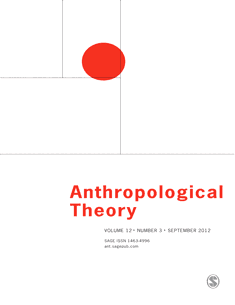
Anthropological Theory
Pioneering New Frontiers in Human UnderstandingAnthropological Theory, published by SAGE Publications Ltd, stands at the forefront of the field of anthropology, delivering cutting-edge research and critical analyses that shape contemporary understanding of human societies. With its ISSN 1463-4996 and E-ISSN 1741-2641, this distinguished journal boasts an impressive impact factor and has been recognized in the Q1 quartile category across both anthropology and arts and humanities disciplines, reflecting its high citation rates and scholarly influence. Covering a wide range of topics from cultural practices to social dynamics, Anthropological Theory serves as an essential resource for researchers, professionals, and students alike, fostering a rich dialogue within the academic community. The journal's continuous publication since 2001 ensures a dynamic platform for emerging theories and methodologies, providing invaluable insights for those engaged in anthropological discourse. Its recognition within the top percentile rankings of Scopus further underscores its significance and attractiveness to contributors seeking to disseminate their work on a global stage.

CRITIQUE OF ANTHROPOLOGY
Exploring the Depths of Cultural DiscourseCRITIQUE OF ANTHROPOLOGY, published by SAGE PUBLICATIONS LTD, stands as a vital platform in the field of anthropology, contributing significantly to the discourse surrounding cultural practices and societal norms since its inception in 1974. Recognized for its scholarly rigor, this esteemed journal holds a Q2 category ranking in both Anthropology and Arts and Humanities as of 2023, with impressive standings in Scopus, including a rank of 55 out of 502 in Social Sciences and 107 out of 552 in Arts and Humanities. The journal's extensive scope—from theoretical critiques to empirical studies—facilitates a rich exchange of ideas among researchers, professionals, and students, thereby enriching the anthropology community. Although CRITIQUE OF ANTHROPOLOGY does not provide open access, its prestigious reputation and impact on the field make it an essential resource for those seeking to deepen their understanding of anthropological scholarship.
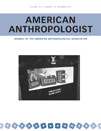
AMERICAN ANTHROPOLOGIST
Elevating interdisciplinary approaches in social sciences.American Anthropologist is a prestigious journal published by Wiley, dedicated to advancing the field of anthropology. With a rich publishing history dating back to 1888, it has become a leading platform for scholarly discourse, showcasing innovative research and diverse perspectives from around the globe. The journal holds impressive ranks within its categories, being recognized as Q1 in both Anthropology and Arts and Humanities, alongside a notable Scopus ranking of #36 out of 502 in Social Sciences. Its robust impact in academia is reflected in its emphasis on interdisciplinary approaches that resonate within the fields of social science and humanities. Researchers and students alike are encouraged to contribute to this vital resource that continues to shape anthropological thought and practice. For those interested, the journal is tailored for non-open access, ensuring the curation of high-caliber scholarly work accessible to a wide audience while supporting the standards of peer-reviewed publications.

AMERICAN JOURNAL OF PHYSICAL ANTHROPOLOGY
Illuminating the Path of Human OriginsAMERICAN JOURNAL OF PHYSICAL ANTHROPOLOGY, published by Wiley, has established itself as a leading platform in the field of physical anthropology since its inception in 1918. This esteemed journal, identifiable by its ISSN 0002-9483 and E-ISSN 1096-8644, has been instrumental in disseminating groundbreaking research, achieving impressive rankings in both Social Sciences (Rank #18/443, 96th percentile) and Medicine (Rank #9/44, 80th percentile) categories within Scopus. Although its coverage in Scopus has concluded as of 2021, the journal continues to be a vital resource for academics and professionals seeking to explore the biological aspects of human evolution and variation. With a commitment to high-quality, peer-reviewed publications, the journal supports open access to enhance the visibility and accessibility of anthropological research globally. Researchers, students, and professionals are encouraged to engage with the innovative findings published in this journal, contributing to the ongoing dialogue in physical anthropology.

ANTHROPOLOGISCHER ANZEIGER
Exploring the Intersections of Humanity and NatureANTHROPOLOGISCHER ANZEIGER, published by E Schweizerbart'sche Verlagsbuchhandlung, is a distinguished journal dedicated to the interdisciplinary fields of anthropology, animal science, and ecology, with a notable impact on advancing research in these areas. Since its inception in 1971, the journal has played a critical role in providing a platform for innovative research, fostering scholarly exchange, and enhancing the understanding of human and animal interactions and ecosystems. With its current quartile rankings—Q2 in Anthropology and Q3 in Animal Science and Zoology—it is well-positioned to serve as a vital resource for researchers, professionals, and students alike. Although it does not currently offer open access, the journal remains an essential asset for those looking to deepen their knowledge and contribute to ongoing discussions within these intersecting disciplines. For additional information, visit the publisher's office located at NAEGELE U OBERMILLER, SCIENCE PUBLISHERS, JOHANNESSTRASSE 3A, D 70176 STUTTGART, GERMANY.